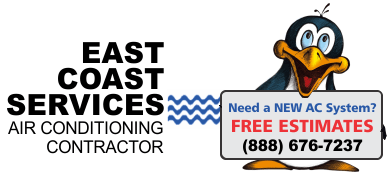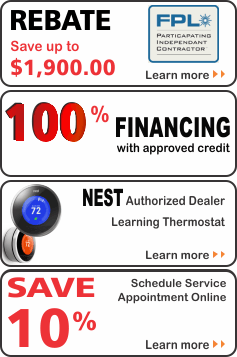Air Conditioning Energy Saving Tips:
East Coast Services Heating & Cooling Energy Tips
Heating and cooling your home uses more energy and drains more energy dollars than any other system in your home. Typically, 44% of your utility bill goes for heating and cooling. No matter what kind of heating, ventilation and air-conditioning system you have in your house, you can save money and increase comfort by properly maintaining and upgrading your equipment. Remember, though, an energy efficient furnace or air-conditioner alone will not have as great an impact on your energy bills as using the whole house approach. By combining proper equipment maintenance and upgrades with appropriate insulation, weatherization and thermostat setting, you can cut your energy bills in half. All major appliances including gas furnaces, boilers, air conditioners and heat pumps sold in California meet the Title-24 energy efficiency 'standards'. If you are thinking about purchasing a new central furnace, please check out our Appliance Database that lists the most energy-efficient models. This database will eventually be interactive allowing you to compare models.
Heating Tips
- Set your thermostat as low as it is comfortable.
- Clean or replace filters on furnaces once a month.
- Clean warm-air registers, baseboard heaters and radiators as needed; make sure they're not blocked by furniture, carpeting or drapes.
- Use kitchen, bath and other ventilating fans wisely; in just one hour, these fans can pull out a houseful of warmed or cooled air. Turn fans off as soon as they have done the job.
- Keep draperies and shades open on south-facing windows during the heating season to allow sunlight to enter your home; close them at night to reduce the chill you may feel from >cold windows.
- Close an unoccupied room that is isolated from the rest of the house such as in a corner and turn down the thermostat or turn off the heating for that room or zone. Do not, however, turn the heating off if it adversely affects the rest of your system.
Heat Pumps
If you use electricity to heat your home, consider installing an energy efficient heat pump system. Heat pumps are the most efficient for of electric heating in moderate climates, providing three times more heating than the equivalent amount of energy they consume in electricity. There are three types of heat pumps: air-to-air, water source and ground source. They collect heat from the air, water or ground outside your home and concentrate it for use inside. Heat pumps do double duty as a central air conditioner. They can also cool your home by collecting the heat inside your house and effectively pumping it outside. A heat pump can trim the amount of electricity you use for heating as much as 30% to 40%.
Heat Pump Tips
- Do not set back the heat pump's thermostat manually if it causes the electric resistance heating to come on. This type of heating, which is often used as a backup to the heat pump, is more expensive.
- Clean or change filters once a month or as needed and maintain the system according to manufacturer's instructions.
Gas and Oil Systems
Gas furnaces are rated for efficiency with an Annual Fuel Utilization Efficiency number, or an AFUE. According to the state's Energy Efficiency Standards, Title 24, the minimum AFUE for central furnace systems now sold in California is 0.78, which means that 78 percent of the fuel used by the furnace actually reaches your home's duct work as heat. The higher the AFUE, the more efficient the furnace. AFUE numbers in today's furnaces range from 0.78 to around 0.90. If you are thinking about purchasing a new central furnace, please check out our Appliance Database that lists the most energy-efficient models.
Gas Furnace Tips
- Don't block registers, vents or heating units with furniture or drapes. That makes your furnace work harder and uses more energy.
- Consider installing a programmable thermostat. You can save as much as 10% a year on your heating and cooling bills by simply turning your thermostat back 10% to 15% for 8 hours with an automatic setback or programmable thermostat.
- Using a programmable thermostat you can adjust the times you turn on the heating or air-conditioning according to a pre-set schedule. As a result, you don't operate the equipment as much when you are asleep or when the house or part of the house is not occupied. Programmable thermostats can store and repeat multiple daily setting (six or more temperature setting a day) that you can manually override without affecting the rest of the daily or weekly program. When purchasing a new thermostat, look for the ENERGY STAR label (www.energystar.gov) and one that allows you to easily use two separate programs; an "advanced recovery" feature that can be programmed to reach the desired temperature at a specific time; and a hold feature that temporarily overrides the setting without deleting preset programs.
Air Conditioners
It might surprise you to know that buying a bigger room air-conditioning unit won't necessarily make you feel more comfortable during the hot summer months. In fact, a room air conditioner that's too big for the area it is supposed to cool will perform less efficiently and less effectively than a smaller, properly sized unit. This is because room units work better if they run for relatively long periods of time than if they are continually, switching off and on. Longer run times allow air conditioners to maintain a more constant room temperature. Running longer also allows them to remove a larger amount of moisture from the air, which lowers humidity and, more importantly, makes you feel more comfortable. Sizing is equally important for central air-conditioning systems, which need to be sized by professionals. If you have a central air system in your home, set the fan to shut off at the same time as the cooling unit (compressor). In other words, don't use the system's central fan to provide circulation but instead use circulating fans in individual rooms. SEER is the Seasonal Energy Efficiency Rating. SEER rates the efficiency during the cooling season. Look for a SEER rating of 13 or above.
Cooling Tips
Whole house fans help cool your home by pulling cool air through the house and exhausting warm air through the attic. They are effective when operated at night and when the outside air temperature is cooler than the inside. Set your thermostat as high as comfortably possible in the summer. The less difference between the indoor and outdoor temperatures, the lower your overall cooling bill will be. Don't set your thermostat at a colder temperature setting than normal when you turn on your air conditioner. It will not cool your home any faster and could result in excessive cooling and therefore unnecessary expense. Set the fan speed on high except in very humid weather. When it's humid set the fan speed on low. You'll get better cooling. Consider ceiling fans to spread the cooled air more effectively through your home without greatly increasing your power use. Don't place lamps or TV sets near your air conditioning thermostat. Plant trees or shrubs to shade air-conditioning units but not to block the airflow. A unit operating in the shade uses as much as 10% less electricity‚ than the same one operating in the sun.
Annual Cooling Cost Comparison
|
Size Or Cooling Capacity In: |
Annual Cooling Cost If The |
Recommended High-Efficiency Systems |
||||||||||||
| Tons | BTU/Hour | 9 | 10 | 11 | 12 | 13 | 14 | 15 | 16 | 17 | 18 | 19 | 20 | |
| 2 | 24,000 | $900 | $810 | $730 | $670 | $620 | $580 | $540 | $500 | $470 | $450 | $420 | $400 | |
| 2.5 | 30,000 | $1,120 | $1,010 | $920 | $840 | $780 | $720 | $670 | $630 | $590 | $560 | $530 | $500 | |
| 3 | 36,000 | $1,340 | $1,210 | $1,100 | $1,010 | $930 | $860 | $810 | $760 | $710 | $670 | $640 | $600 | |
| 3.5 | 42,000 | $1,570 | $1,410 | $1,280 | $1,180 | $1,090 | $1,010 | $940 | $880 | $830 | $780 | $740 | $710 | |
| 4 | 48,000 | $1,790 | $1,610 | $1,470 | $1,340 | $1,240 | $1,150 | $1,080 | $1,010 | $950 | $900 | $850 | $810 | |
| 4.5 | 54,000 | $2,020 | $1,810 | $1,650 | $1,510 | $1,400 | $1,300 | $1,210 | $1,130 | $1,070 | $1,010 | $950 | $910 | |
| 5 | 60,000 | $2,240 | $2,020 | $1,830 | $1,680 | $1,550 | $1,440 | $1,340 | $1,260 | $1,190 | $1,120 | $1,060 | $1,010 | |



